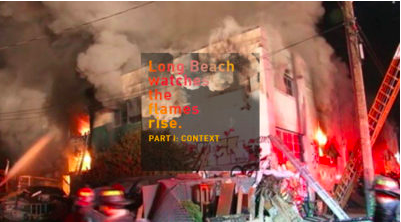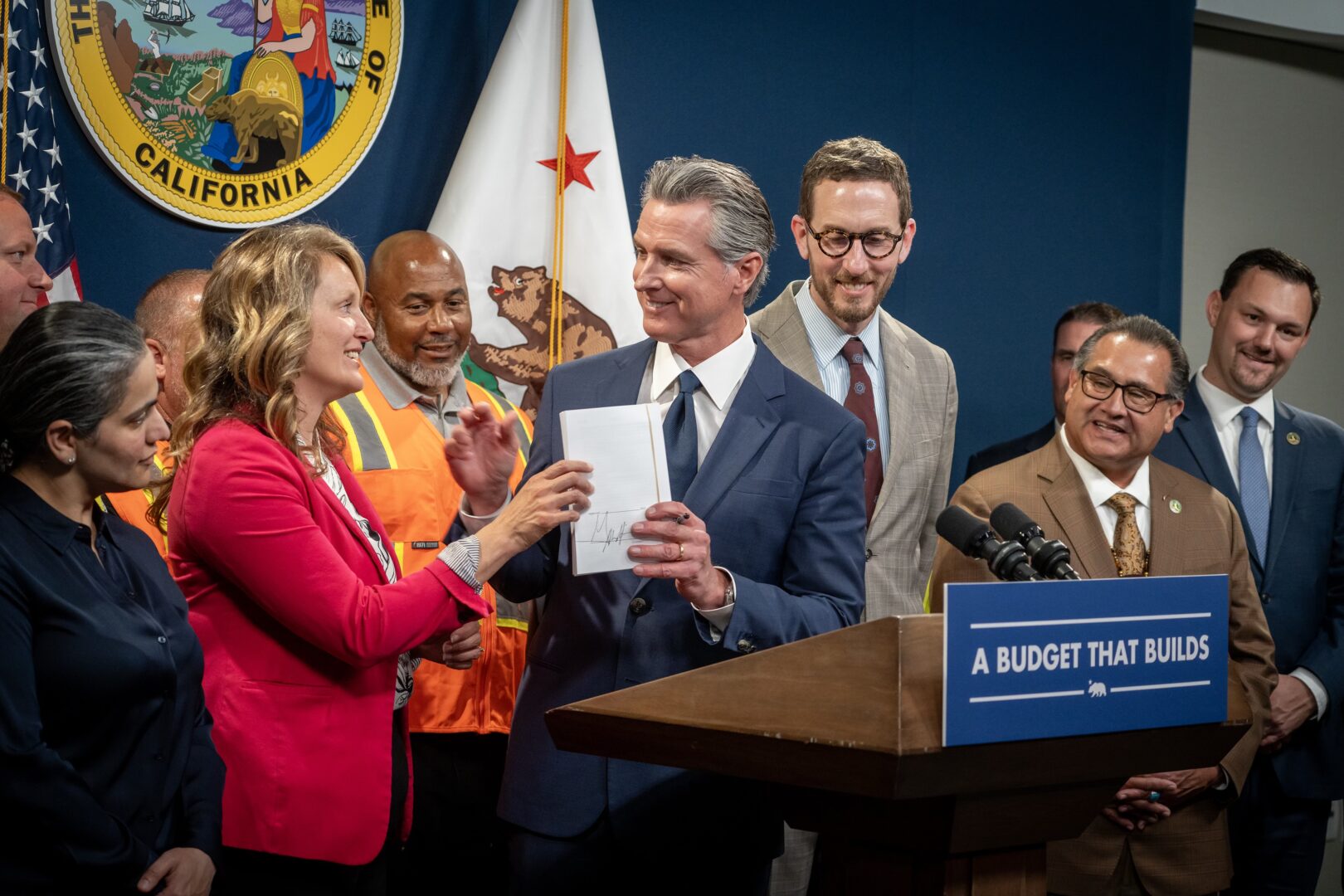Long Beach is very much a Spirit Animal of Oakland.
Both come with assumptions and pretense from outsiders; it is difficult for the stereotypes about each city to not tickle the brains of Angelenos and San Franciscans alike.
And each face dire situations when it comes to housing, with Oakland representing the do-nots and Long Beach representing the what-ifs.
Oakland's tragedy at Ghost Ship—an artist collective inside a warehouse that was, to say the least, unfit for living with its grey water spouting from its faucets, questionable toilet facilities, and lack of infrastructural quality—where 36 people died after a fire dissolved the makeshift home into ashes acts a mirror to SoCal and Long Beach specifically.
Media outlets were quick to point to the Bay Area's influx of rich tech entrepreneurs and the seemingly holding-hands-with-the-municipality developers that were coming in building luxury high-rises. This is why, America, artists were lured to the unstable warehouse for living: $400/month rent in the nation's 4th most expensive market. Even more, it was also a space that prevented some from being outright homeless—and now, even those dilapidated spaces, are in danger as eviction notices across Oakland are being handed out in light of the tragedy.
The logic then followed with pointing out the lack of housing in the region: between 2010 and 2015, the Bay Area metro population grew by 100,000 people per year, but added only 20,000 units per year, according to U.S. Census Bureau data. The result, particularly for Oakland? A 68% increase in rents between 2007 and 2015.
You’re a beauty, Oakland—and it's heart-shattering that your most marginalized have been ignored in a political conversation that has outright ignored potential solutions.
But this makes it seem as if the area just "wasn't prepared," either structurally or politically, for the situation but that is being alarmingly dishonest. With a political zeitgeist running rampant in the city—one that simultaneously vilified those rich tech folks as well as developers as ruining San Francisco's essence—the backlash that occurred was frightening: it didn't stop the rich tech folks from coming in but it sure did halt developers from building.
"The funny thing people think is that rich folk want to live here [in Oakland]," cab driver Barry Waterman told me while he was taking me to the Amtrak station in Oakland. "Nah... They have to live here because they aren't building enough homes in San Francisco. So they come here, see how shitty their neighborhood is, gentrify it to make it the way they want it, and then peace out when they score a joint across the way. This is the story of Oakland no one is talking about."

A memorial service held on December 12, 2016 at the wreckage of Ghost Ship. Photo by Scott Strazzante.
Waterman's account rings true on many levels, especially when considering the alarming rent increases due to the influx of wealthy people that would otherwise live in San Francisco but cannot.
The ultimate result of not building housing when we have a huge influx on people coming in? An imbalance that forces the most marginalized to live in substandard if not outright horrible conditions; it is the forced hand dealt to those who have no other options. This includes places like Ghost Ship. This includes nightmarishly maintained units in rent-controlled areas, with property owners clutching pennies because they cannot arbitrarily raise rent on those who live there.
One can’t ignore economics: if you have a bunch of people across the entirety of the economic strata vying for a particular resource but not enough of that resource is being offered, only the highest within that strata are going to get that resource.
This includes potential risks in Long Beach.
Los Angeles faces a similar situation to San Francisco: an influx of newcomers with an uncomfortable lack of housing, prompting housing booms in South Central, DTLA, and other areas that were once deemed deplorable by the wealthy. It is natural to think that the gentrification of Los Angeles–which is so heightened that property owners are even forgoing Section 8 vouchers in favor of turning straight to the market–will prompt overflow into Long Beach.
And this needs to be considered.
Long Beach has already seen skyrocketing rents while homeowners have seen a 7.5% increase in median home value over the past year alone (and looking to increase even further). When you pair this with the fact that, as of the past decade, relatively low development has occurred with a surge in the past few years—albeit development with little to no affordable housing—we are creating a disaster day by day. (Long Beach's growth echoes Los Angeles' growth: in 2012, the median house value was around $385K while now it averages nearly $600K.)

We'll repeat it again: one can’t ignore economics. If you have a bunch of people across the entirety of the economic strata vying for a particular resource but not enough of that resource is being offered, only the highest within that strata are going to get that resource. Even more, you can’t simultaneously bitch about high density while also complaining about increasing housing costs and the displacement of residents because it’s nothing short of cognitive dissonance.
Then come the NIMBYs and classists, shouting rhetoric ranging from, "Don't you want to preserve your life here?" to "Well, if you can't afford to live here, you need to move."
There's a reason people tolerate these conditions and it is two-fold, especially for artists: there's a potential economy to provide them work (Ghost Ship was filled with working artists) and there's a cultural value to urban living.
That latter point is particularly important and one that often gets lost in the fray of urban design and affordable housing discussions.
Everyone wants to be proud of their home but to be proud of your home is different and if there is one way in which, at least for me, Oakland proved to eerily reflect Long Beach it was that sense of pride.
"The funny thing people think is that rich folk want to live in Oakland. Nah... They have to live here because they aren't building enough homes in San Francisco. So they come here, see how shitty their neighborhood is, gentrify it to make it the way they want it, and then peace out when they score a joint across the way. This is the story of Oakland no one is talking about."
Genuine pride.
There’s the pride that people need in order to not lose their sanity; it’s an odd mixture of authenticity and façade, of desire and desperation. And then there’s the pride which you acknowledge the shitty’n’ugly parts without dismissing their implications, you note the mistakes that you and countless others have made while trying to make life on all levels a bit better but there remains, oh so loudly, a sense of optimism (even though it might be tainted with a subtle glow of pessimism that makes you all the more human)…
You’re a beauty, Oakland.
Not the sterility of pageant-girl beauty. Not the intimidating beauty of honed perfection. But imperfect-ed beauty. Beauty in the random. Distracting beauty. ADD beauty. Let’s-do-this beauty. Let’s-not-throw-that-away beauty. Let’s-make-that-beautiful-again beauty. Put-on-your-red-shoes-and-dance beauty.
And it's heart-shattering that your most marginalized have been ignored in a political conversation that has outright ignored potential solutions.
This was originally posted on Streetsblog's sister site Longbeachize.
Additional reporting by Baktaash Sorkhabi. Photo by Cathleen Miller.
This is Part I of a two-part series. Part I explores the context of the situation in Oakland while Part II, set to be published soon, will explore solutions.

Photo by Maya Cueva.






